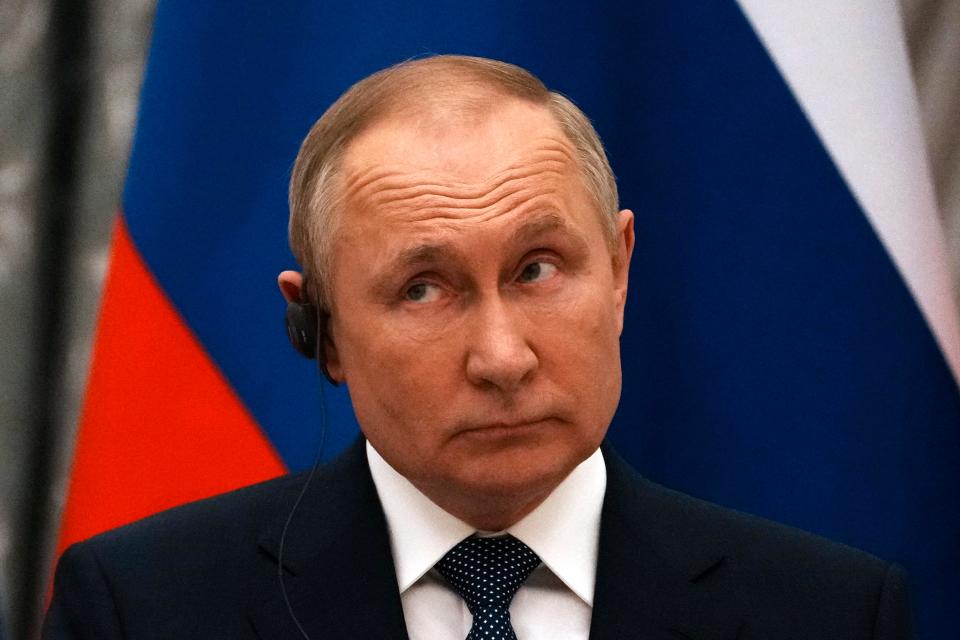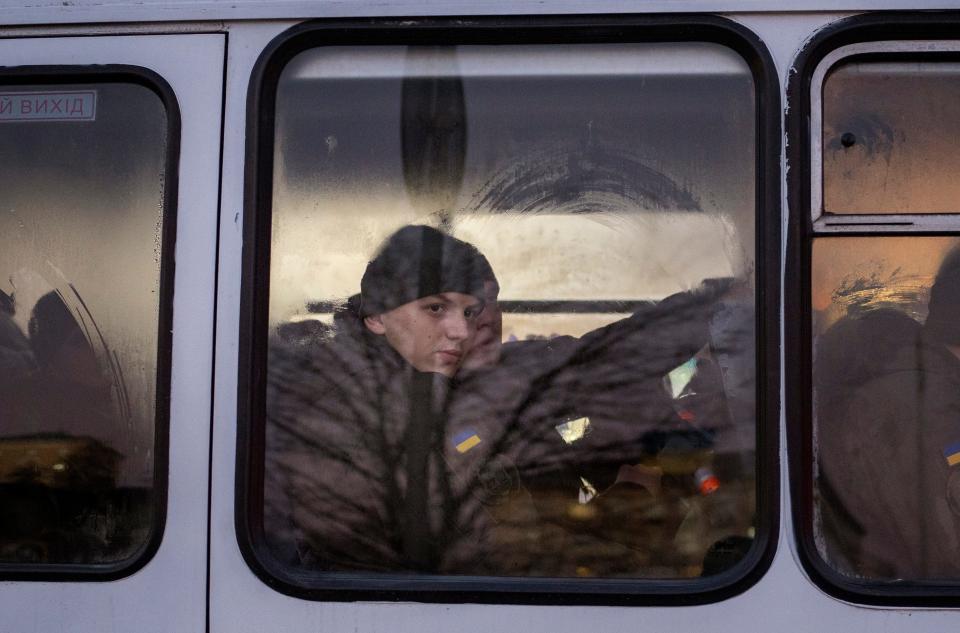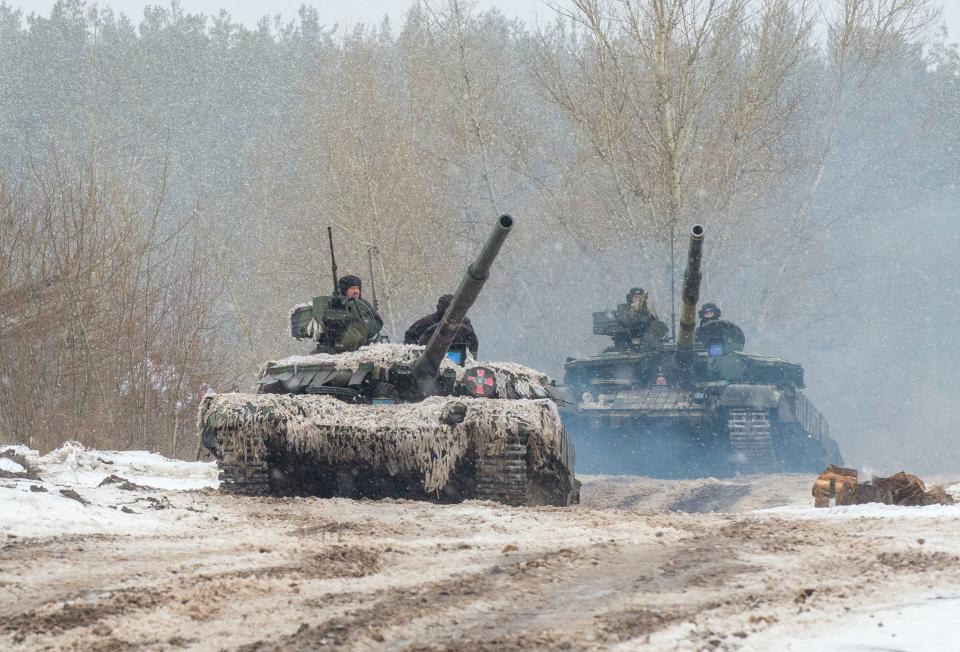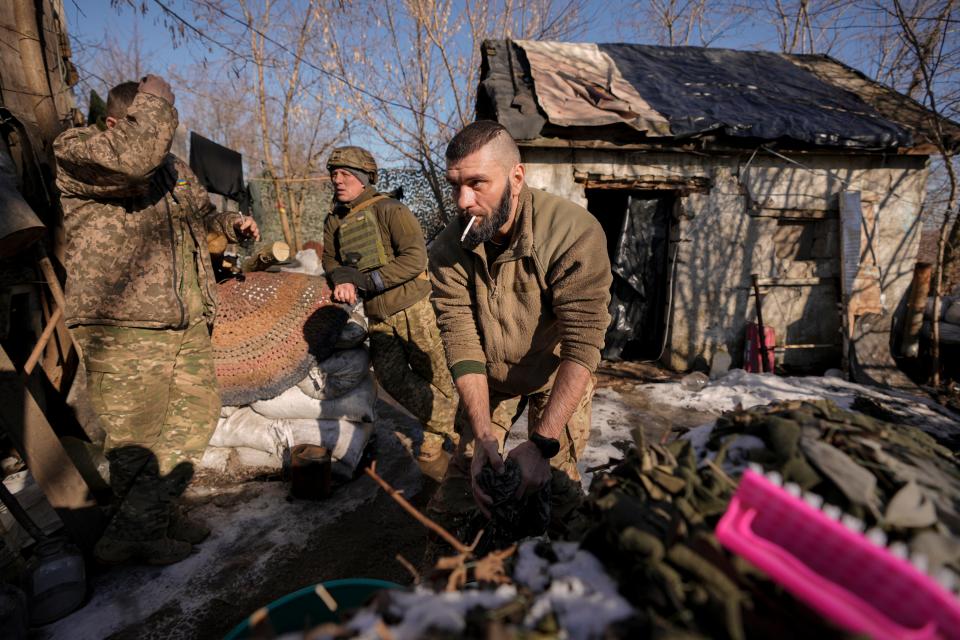Why is the White House releasing US intelligence on Putin's moves in Ukraine? Behind the unusual strategy
WASHINGTON – It's all hype and hysteria, an effort by the U.S. and its allies to stoke Russia-Ukraine tensions and a pretext for the West to send more military aid to Kyiv.
That's how top Kremlin officials and Russia's tightly controlled state media are casting the Biden administration's increasingly stark warnings that Russia could invade Ukraine "any day now."
"It's already past midnight, and there are still no Russians," one Russian nationalist news outlet proclaimed in a headline in recent days, mocking Washington's dire warnings.
But experts say the White House's unusual strategy – disclosing U.S. intelligence assessments of a foreign adversary's apparent military plans – may be unsettling Russian President Vladimir Putin, known as a master of propaganda and manipulation.
"The very public discussion of the Russian threat is designed to keep Moscow off balance," said John Herbst, a longtime U.S. diplomat who was ambassador to Ukraine from 2003 to 2006.
If Putin decides not to invade, Herbst said, "I would credit that specific tactic as contributing to a successful outcome – if in fact that's what we have."
On Tuesday, Russian President Vladimir Putin said he is ready for talks with the U.S. and NATO on limits for missile deployments and military transparency, as his defense ministry said it had started pulling back some troops from Ukraine's border, where they were engaged in military exercises.
At the White House, President Joe Biden welcomed Russia's moves but said an invasion remains "very much a possibility."
The president expressed skepticism that any Russian troops have been pulled back from Ukraine's border, saying that U.S officials have yet to verify those details.
"Our analysts indicate that they remain very much in at threatening position," he said. "And the fact remains right now Russia has more than 150,000 troops in circling Ukraine and Belarus and along Ukraine's border and invasion remains distinctly possible."

A 'false flag' and other disclosures
The drumbeat of disclosures began weeks ago and seemed to reach a crescendo on Friday when Jake Sullivan, President Joe Biden's national security adviser, began a White House briefing with this nugget: "We are in the window when an invasion could begin at any time."
Perhaps the most startling piece of information, however, came early this month when U.S. intelligence officials said they had evidence of Russian plans for a "false flag" operation in which the Kremlin would release a fake video depicting an attack on its troops. Moscow could then use that "attack," made to look as if it were carried out by Ukrainian or allied forces, as a pretext to invade Ukraine, the U.S. officials warned.
What is a false flag? U.S. says Russia may use the tactic to justify Ukraine invasion
Stephen Slick, who spent 28 years in the CIA's clandestine service and served on the National Security Council, said the U.S. revelations have at the very least complicated Russia's planning.
The administration has been "unusually proactive" in its efforts to exploit U.S. intelligence information about Russia’s possible invasion of Ukraine, Slick said. Usually that intelligence is used to inform U.S. policy behind the scenes. But in this situation, he said, "it is also being deployed to shape the information environment in a manner that the administration hopes will constrain Russia’s future actions."
Disclosing the possible false flag plan could make it harder for Russia to get away with such an operation or even discourage Moscow from trying in the first place, said Daniel Chirot, an emeritus professor of international politics at the University of Washington.
“Exposing such plans actually can contribute to preventing it," Chirot said. "If you're caught ahead of time planning the lie, or some sort of deception ... it means that far fewer people would be fooled."

The audience beyond Moscow
But he said the audience for the U.S. disclosures isn't just Putin and his Kremlin allies. It's also Americans who may not support an aggressive U.S. response if Russia invades its neighbor. Biden has threatened crippling sanctions on Russia if Putin attacks Ukraine. And the Pentagon has sent several thousand U.S. troops to Poland and other eastern European countries to shore up NATO's defenses.
"There are some both on the far left and on the far right in this country who want to just stay away and say it's none of our business," Chirot said. "So it's a good idea to be as public as possible about what's happening."
Why is Vladimir Putin threatening Ukraine? Respect, fear, power at play in Russian leader's motivations
Jason Blazakis, director of the Center on Terrorism, Extremism, and Counterterrorism at the Middlebury Institute of International Studies at Monterey, said the U.S. strategy carries some risks, including exposing U.S. intelligence sources.
"They've been very careful about not illuminating the sources, but just the fact that the United States has said something with some level of specificity could illustrate to the Russians that the United States has either human intelligence on this or communications-related intelligence," he said. "It could burn the sources of information."
A U.S. official, speaking on the condition of anonymity, said protecting intelligence sources and methods has been "our North Star."
The official agreed that the release of information has been unprecedented but said it has been done in "extremely close coordination with the intelligence community."
Blazakis said he understands the Biden administration's strategy, but it may not work, particularly given Putin's iron grip on Russian media.
"I think the United States needs to be careful in understanding that a false flag still has a lot of great potential benefits for Putin at home in terms of consolidating public support within the Russian public," he said.
"The false flag provides him a really creative narrative to use at home. That's what really worries me about this."
Better trained, better equipped: What you should know about Russia and Ukraine's militaries
Signs from Putin and the Kremlin
Indeed, Russian officials and state-controlled media outlets have cast the U.S. and Ukraine as instigators.
"The US is stoking hysteria over our so-called planned Russian 'invasion,' giving even the dates of this 'invasion,' all the while working jointly with its allies to build up Ukraine’s 'military muscle,'" Yury Ushakov, an aide to Putin, told Russian reporters in a briefing after Biden and Putin spoke by phone Friday.
The West is spending "significant funds" to modernize Ukraine's armed forces, "and more military instructors are being sent there," he said. "So, the 'invasion' chorus is a backdrop to create opportunities for possible provocations by the Ukrainian military."
Boris Vishnevsky, one of the leaders of a Russian opposition party called Yabloko, said Washington is right to publicly outline Putin’s intentions.
“Biden is right: The threat of the war is real. Both President Putin and the Kremlin have given us all sorts of signs during the past few months," he said in an interview Monday.
But Vishnevsky is not convinced the U.S. tactics will protect Ukraine from a Russian assault. “Only two things could stop the war and save Ukraine: if the U.S. sent more serious weapons to Ukraine or if the U.S. seized all Putin’s assets or the assets of Putin’s closest circle."

But, he noted, neither is happening.
Herbst said no matter what disclosures the U.S. makes about Russian intentions, Putin can win the propaganda war at home, even if he doesn't invade Ukraine.
"He could turn on a dime and have the spinmeisters (in) the Russian media saying he's achieved some great accomplishment by focusing the rest of attention on Russia for all these months," Herbst said.
He said Putin already can claim one PR victory, thanks to all of Washington's warnings of war in Ukraine.
"Just this buildup has created real damage to the Ukrainian economy," he said. There has been a run on Ukraine's national currency, and foreign investors, already wary, have become jittery, he said.
Contributing: Maureen Groppe
Sanctions: Biden threatens devastating sanctions if Russia invades Ukraine. Here's what that might look like.
'Wakeup call for Americans': Russia, Ukraine in behind-the-scenes lobbying war over Nord Stream 2

This article originally appeared on USA TODAY: Russia and Ukraine: Why Biden advisers disclosed intel on Putin plans

